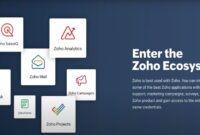Custom CRM Solutions – In the current highly competitive climate, businesses require more than just standard solutions; they require systems that are specifically tailored to match their individual requirements. Make your way to the Custom CRM Solutions page. When compared to generic customer relationship management software, custom solutions are distinguished by the fact that they are specifically customized to match your operational objectives, optimize operations, and strengthen relationship with customers. This article will investigate the ways in which tailored customer relationship management (CRM) systems can improve the optimization of company processes, increase efficiency, and create a competitive advantage.
This has resulted in a large growth in the demand for customized solutions, which can be attributed to the increased realization of the possibilities of CRM (Customer Relationship Management) systems by organizations. When compared to a solution that is available off the market, what specific characteristics contribute to the higher applicability of a custom customer relationship management system for optimizing operations?
Custom customer relationship management (CRM) systems are platforms that are developed particularly to match the demands of a company’s operations. A more streamlined and effective user experience is provided by custom customer relationship management systems (CRMs), in contrast to typical CRMs, which offer basic functionality. Custom CRMs are suited to your specific processes, customer journeys, and business goals. In addition to being able to scale with your company, these systems can interact with software that is already in place, automate processes that are routine, and provide analysis that is comprehensive.
Frequently Asked Questions About Custom CRM Solutions
If you know the right questions to ask your CRM vendors, you’ll not only be able to make a well informed decision, but you will also increase your likelihood of long-term success with the CRM. Here are the crucial questions I recommend asking your CRM vendors:
1. Why Should Businesses Choose a Custom CRM Over a Generic One?
A custom CRM allows businesses to modify workflows, reporting structures, and integration methods to perfectly suit their needs. Unlike generic CRMs, which may include unnecessary features, custom CRMs focus solely on what your business requires, enhancing efficiency and cutting down operational costs.
2. What Is the ROI of Implementing Custom CRM Solutions?
The ROI on custom CRM solutions can be impressive. According to research, businesses implementing CRM systems can see a 29% increase in sales and a 34% improvement in customer retention. Moreover, CRM systems return $8.71 for every dollar spent, making them a cost-effective solution for growing businesses.
3. How Does a Custom CRM Improve Business Operations?
Custom CRMs streamline workflows, eliminate redundancies, and provide real-time data analytics. By automating routine tasks like follow-up emails, data entry, and customer segmentation, businesses can free up valuable time for higher-value tasks. For example, sales teams can focus on closing deals rather than tracking leads, while customer support can respond faster with real-time insights into customer interactions.
4. What Industries Benefit the Most from Custom CRM Solutions?
While custom CRMs can benefit all industries, sectors such as retail, hospitality, healthcare, and finance find them particularly useful. These industries often have complex customer journeys and high volumes of data, requiring more specialized tools than generic CRMs offer.
Key Benefits of Custom CRM Solutions for Business Operations
- Tailored to Your Needs
A custom CRM fits your business like a glove. You won’t have to worry about unwanted features slowing you down, as every component is built around your specific processes. Whether it’s sales automation, customer support, or marketing integration, you get exactly what you need—no more, no less. - Automation and Efficiency
Imagine being able to automate up to 80 percent of your business procedures, such as sending emails and updating details about your customers. Custom customer relationship management systems accomplish this by automating mundane processes and freeing up members of the team to concentrate on more important responsibilities. - Scalability
As your business grows, so too will your operational needs. Custom CRMs are built to scale alongside your business, ensuring you never outgrow the system. They can accommodate additional features, more users, and growing data volumes without losing efficiency. - Better Data Management
Data is the backbone of modern businesses. Custom CRMs help businesses organize, manage, and analyze large volumes of customer data in real time. This results in actionable insights that allow you to predict trends, anticipate customer needs, and improve overall business decision-making. - Enhanced Customer Experience
Custom CRMs allow businesses to offer personalized experiences by storing detailed information on customer preferences, past interactions, and buying patterns. With this information, you can offer personalized recommendations, improve response times, and build lasting relationships with your clients. - Cost-Effectiveness in the Long Run
Although a custom CRM may seem like a larger upfront investment, the long-term benefits far outweigh the initial costs. By eliminating inefficiencies, reducing manual work, and improving customer satisfaction, a custom CRM can significantly boost profitability.
How Custom CRM Solutions Optimize Specific Business Operations
Custom CRM systems have the potential to transform every department in your organization. Here’s how they can optimize different business operations:
1. Sales
Custom CRMs can automate lead tracking, forecast sales, and personalize communication based on customer behavior. For instance, sales teams can use automated reminders and follow-up systems, improving their productivity and closing more deals.
2. Marketing
By analyzing customer data to find patterns and preferences, marketers may use custom customer relationship management systems to build campaigns that are more focused. Marketing efforts can be made more effective and tailored with the help of tools such as email marketing automation, campaign tracking, and consumer segmentation.
3. Customer Support
A custom CRM provides customer service teams with real-time insights into customer histories, allowing them to resolve issues faster and more efficiently. With features like automated ticket routing and chat integrations, support teams can provide quicker and more personalized responses, improving overall customer satisfaction.
4. Finance
Custom CRM solutions offer finance departments detailed insights into customer transactions, payment histories, and financial forecasting. This leads to better invoicing, reduced errors, and a more accurate understanding of revenue streams.
Custom CRM Solutions: Key Statistics
Managing Businesses has become complicated with the tech industry being dynamic than ever before. Thus, CRM becomes an indispensable tool for businesses who seek to streamline their operations. According to statistics, custom CRM development can boost companies’ conversion rate up to 300%.
A question you might ask is: Is custom CRM development right for your business? Well, to stay ahead, your company needs to focus on customer satisfaction and drive its growth strategy accordingly.
Custom CRM development offers a plethora of benefits, and companies quickly see positive results from the investment. Nucleus Research reports that for every dollar spent on CRM, companies earn a return of $8.71.
Hence, to follow a customer centric approach, CRM software is the way to go. To retain the existing customers and get a hold of new customers companies must maintain the database and gain more insights on the customer behaviour, this will ultimately lead to improved business relations and profitability.
To underscore the benefits of custom CRMs, here are some compelling statistics:
- 47% of CRM users report improved customer retention.
- 79% of sales teams using a CRM achieve their quotas, compared to 63% of those who don’t use a CRM.
- Companies using CRM systems have seen 30% increases in lead conversion rates.
These numbers highlight the importance of CRM solutions, particularly custom ones that are built to meet the specific needs of your business.
Implementing a Custom CRM: Step-by-Step Guide
For the goal of commencing the process of adopting a customer relationship management system that is personalized to your organization, the following is a straightforward technique that may be utilized:
1. Assess Your Needs
Begin by conducting an internal audit of your existing workflows, customer data management, and reporting structures. Identify inefficiencies and gaps that a custom CRM can help solve.
2. Set Clear Objectives
What do you want to achieve with your CRM? Whether it’s improving customer retention, automating repetitive tasks, or enhancing your reporting capabilities, be clear about your goals.
3. Choose a Reliable Vendor
Selecting the right CRM developer is crucial. Look for companies with a proven track record in creating custom solutions for businesses in your industry.
4. Customize Features
Work with the developer to design a CRM tailored to your business. This includes selecting features for automation, integration, data management, and analytics.
5. Train Your Team
Even the best CRM won’t deliver results if your team doesn’t know how to use it. Invest time in comprehensive training so that employees across departments can leverage the system to its full potential.
6. Monitor and Adjust
Once the CRM is in place, continuously monitor its performance and make necessary adjustments to improve efficiency and adaptability as your business evolves.
Conclusion
Businesses that are looking to streamline their processes, improve their interactions with customers, and encourage growth are now considering the investment in a bespoke customer relationship management (CRM) solution to be a necessary requirement rather than a luxury. A customizable customer relationship management system offers unrivaled versatility and efficiency because of its capacity to conform to the procedures that are unique to your business and to grow in parallel with your organization. No matter what sector you work in—whether it be sales, marketing, customer service, or finance—a customer relationship management (CRM) system that has been carefully built has the ability to change your operations and lay the groundwork for future accomplishments.



